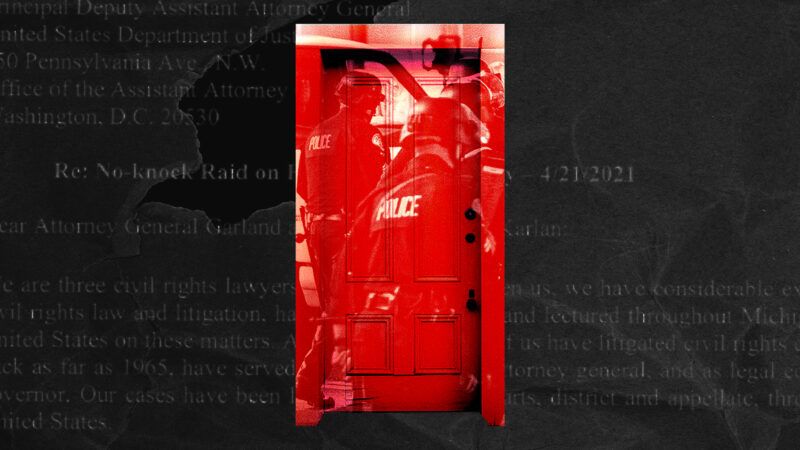Michigan Cops Raided a Home, Damaged the House, and Held a Family at Gunpoint. It Was the Wrong Address.
Accountability is unlikely.

Michigan State Police (MSP) and a local SWAT team in April executed a raid on a home in Flint, Michigan, battering down the door and holding the family at gunpoint while they went through their things.
A confidential informant gave the cops the address—for the wrong house.
This month, attorneys for Renee Dunigan, 56, Michelle Colston, 28, and Colston's three minor children requested a federal civil rights investigation into the raid that saw scores of officers forcibly enter their home apparently without the proper vetting.
The cops "smashed in their front door without any notice while effectuating a 'no-knock' warrant," reads a letter from William H. Goodman, Julie H. Hurwitz, and Teresa Bingman, the family's lawyers, addressed to U.S. Attorney General Merrick Garland and Principal Deputy Assistant Attorney General Pamela Karlan. "They rousted the family at gunpoint, literally from shower, sleep, and bed, and forced them to sit together for one hour—in Michelle's case unclothed, having just stepped out of the shower—while approximately 50 officers tore the house apart." The offices of Goodman Hurwitz & James P.C. did not respond to request for comment.
Police set the raid in motion after speaking with their source, who told them that a car parked in the Dunigan-Colston driveway belonged to the family. That same driveway was shared with a neighbor, though law enforcement didn't verify who actually owned the vehicle before seeking the warrant and executing the raid.
"It appears the police did no pre-raid investigation regarding the Dunigan/Colston home prior to smashing in their front door and never even bothered to confirm the name and registration for the car in question," notes the letter. "The family has also learned that the [informant] provided this information to protect the neighboring house."
"They're clearly still having nightmares, still having problems sleeping, still struggling with seeing police," Aaron Dunigan, Renee's son, told the local NBC affiliate. "My three year old nephew sees police and asks, 'are they going to our house?" he said.
The Michigan family joins an unfortunately long list of people who have been victimized by wrong-door, no-knock raids, where police employed the high-stakes tactic without ensuring basic details were in order, like correct names and addresses.
In 2019, a wrong-door raid on a Chicago woman's home—who was handcuffed, naked—sparked nearly 100 misconduct allegations in one evening. (It was based on a so-called John Doe warrant, an authorization grounded in confidential, anonymous sources.) Over the last few years, 10 similar lawsuits have been filed in Chicago alone. A few choice examples: Also in 2019, police bust into an innocent family's house on a John Doe warrant and handcuffed an 8-year-old; during another instance, 17 cops targeted the wrong residence and interrupted a 4-year-old's birthday get-together with guns drawn.
Consider too the case of Onree Norris, who was sitting in his Georgia home when more than two dozen cops set off flash-bang grenades and barged into his house when they meant to raid the place next door. They originally had the correct address, but diverted to Norris' home when they showed up on the scene and thought the target residence looked different than expected. Without delay, they turned their attention next door. They had it right the first time.
Most fraught is that all of the officers in that case were awarded qualified immunity, the legal doctrine that bars victims of government malfeasance from bringing lawsuits against state actors if the way in which their constitutional rights were violated hasn't been meticulously outlined somewhere in a prior court precedent.
Two cops who allegedly stole $225,000 while executing a search warrant, for example, were protected by qualified immunity, because no court ruling said that theft under such circumstances is unconstitutional. So, too, were the four cops who beat a man during a routine traffic stop, the two cops who assaulted and filed bogus charges against a man for standing outside of his own house, and the cop who debased a man's car during a drug search that he initiated with fabricated information.
Put differently, a federal court told Norris last month that he will not be able to sue the cops who threw explosives in his house without doing the most basic homework.
Aaron Dunigan says his family wants compensation. Understandably. Yet should they decide to seek it, it's not unlikely that they'll meet the same fate as Norris.


Show Comments (50)